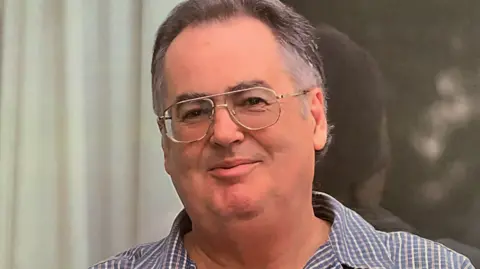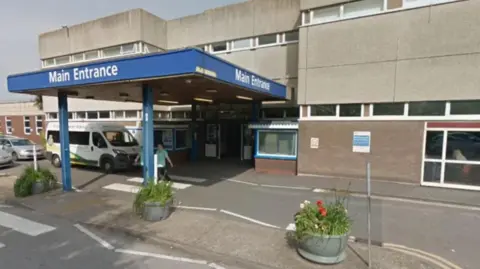Widow 'loses faith in hospital' over treatment plan
 Family handout
Family handoutA widow has criticised the NHS for adding a treatment plan to her late husband's medical files without, she said, consulting him or his family.
Irene Osprey's husband Jim died from pancreatic cancer in February 2023. She said doctors at Eastbourne District General Hospital added the form, which outlined what treatment should be given in an emergency situation, on 7 January 2023.
Ms Osprey said it was only by chance that her family found out and that she had now "lost all faith in the hospital".
East Sussex Healthcare NHS Trust said it had "spoken to her and her family about her concerns".
 Google
GoogleMs Osprey said she was trying to draw attention to misunderstandings around Recommended Summary Plan for Emergency Care and Treatment (Respect) forms.
The forms are a patient-held document that outlines individual care preferences in an emergency situation, including decisions about cardiopulmonary resuscitation (CPR).
Ms Osprey said she believed there was "cause for concern".
"My husband had pancreatic cancer, so I wasn't kidding myself that there was going to be a cure, but my husband wanted to take whatever treatment was available right up to the end," she said.
"Medical professionals have no right to put Respect forms in patient files without patient consent, or that of their family should they lack the mental capacity to do so."
According to the Resuscitation Council UK, a Respect plan is created through conversations between a person and the health professionals who are involved with their care.
"The plan should stay with the person and be available immediately to health and care professionals faced with making immediate decisions in an emergency in which the person themselves has lost capacity to participate in making those decisions," said the spokesperson.
Ms Osprey said: "We knew they would not attempt CPR and that was indicated on the form, but we wanted any other treatment to be given.
"On three occasions he could simply have been let go.
"Jim's wishes literally until he got through our front door was they did everything to get him home, so would never have asked for no further action."
A spokesperson for East Sussex Healthcare NHS Trust said: "Mrs Osprey has the trust's deepest condolences on the passing of her husband, and we have spoken to her and her family about her concerns.
"Since Mr Osprey's death, we have worked with our clinical staff to ensure that all conversations with patients about their end-of-life care - particularly after those that are recorded on ReSPECT forms - are fully recorded in patient notes, and discussed with patients' families in a timely way as a principle of good practice."
Follow BBC Sussex on Facebook, on X, and on Instagram. Send your story ideas to [email protected] or WhatsApp us on 08081 002250.
